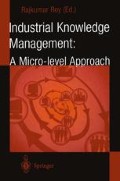Abstract
Knowledge can be used to build applications that carry out a number of complex activities (e.g., diagnosis, monitoring, decision-making). However, knowledge is difficult to elicit and not easy to represent. Moreover, the way knowledge may be related to other forms of data (e.g., collected in human-computer interaction) such that computer-based problem-solving becomes possible, is often unclear. In this paper, an approach to knowledge management is described that uses sequences of symbols. This sort of data is a by-product of numerous human activities, but it is also the output of many process control devices. We present some examples that support the claim that this method lessens the burden of knowledge acquisition and opens new perspectives for knowledge management.
Access this chapter
Tax calculation will be finalised at checkout
Purchases are for personal use only
Preview
Unable to display preview. Download preview PDF.
References
Bell, J., & Machover, M., 1986, A course in mathematical logic. North-Holland Amsterdam.
Breuker, J. & Wielinga, B., 1989, Models of expertise in knowledge acquisition. In Guida G. and Tasso C. (Eds.), Topics in Expert System Design — Methodologies and Tools, 265–295, North-Holland Amsterdam.
Chung, K., 1968, Markov chains with stationary transition probabilities. Springer-Verlag Berlin.
Duffy, V. G. & Salvendy, G., 1999, Problem solving in an AMT environment: difference in the knowledge requirements for an interdisciplinary team. International Journal of Cognitive Ergonomics, 3, 23–35.
Goel, V. & Pirolli, P., 1992, The structure of design problem spaces. Cognitive Science, 16, 119–140.
Janetzko, D., 1996, Knowledge Tracking: A method to Analyze Cognitive Structures. University of Freiburg/Germany. IIG-Berichte, 2.
Janetzko, D. (1998a). Analyzing sequential data via knowledge tracking— An animated tutorial and a remote calculation device for knowledge tracking, http://www.knowledge-tracking.com
Janetzko, D. (1998b). Tracking Cognitive Representations. In M. A. Gernsbacher & S. J. Deny (Eds.), Proceedings of the Twentieth Annual Conference of the Cognitive Science Society. 1229.
Janetzko, D. (1999). Statistische Anwendungen im Internet — In Netzumgebungen Daten erheben auswerten und präsentieren (Collecting, Analyzing and Presenting Data via Internet. Addison-Wesley Munich.
Krantz, D., Luce, R., Suppes, P, & Tversky, A. (1971). Foundations of measurement Vol. 1. Academic Press New York
Sobol, M. G. & Lei, D., 1994, Environment, manufacturing, technology, and embedded knowledge. International Journal of Human Factors in Manufacturing, 4, 810–829.
Author information
Authors and Affiliations
Editor information
Editors and Affiliations
Rights and permissions
Copyright information
© 2001 Springer-Verlag London
About this chapter
Cite this chapter
Janetzko, D. (2001). Selecting and Generating Concept Structures. In: Roy, R. (eds) Industrial Knowledge Management. Springer, London. https://doi.org/10.1007/978-1-4471-0351-6_5
Download citation
DOI: https://doi.org/10.1007/978-1-4471-0351-6_5
Publisher Name: Springer, London
Print ISBN: 978-1-4471-1075-0
Online ISBN: 978-1-4471-0351-6
eBook Packages: Springer Book Archive

